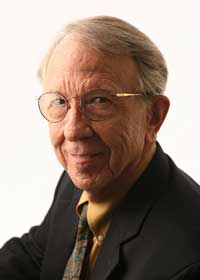By Jeff Brumley
C.S. Lewis did it during his lifetime and he’s continued to do it in the 50 years since his death on Nov. 22, 1963: inspire Christians from theologically diverse traditions through his theological and fictional work.
Box sets of his theological bestsellers, including Mere Christianity, and his fictional works continue to adorn bookstore shelves and have moved into the e-book realm — and they continue to draw praise from Christians who do not worship or even socialize together.
Cooperative Baptist Kevin Glenn and Southern Baptist Steven Owensby are perfect examples of that.
Glenn, the pastor of Memorial Baptist Church in Columbia, Mo., calls himself “a Lewis addict” who admires the late Anglican for promoting the commonalities between Christians.

“Baptists love him just as much as Anglicans because he embodied what it means to keep the essentials front and center,” Glenn said.
Owensby, meanwhile, said he continues to read those writings of Lewis’ that lend themselves to apologetics and promoting Christianity over other religions.
“I would recommend him to other Christians, especially some of his writings about why to believe and the greatness of belief,” said Owensby, pastor of Enoree First Baptist Church in South Carolina.
Lewis’ works have continued to enjoy popularity, mostly in America. Historically his draw was among Anglicans, Catholics and some mainline Christians.

But that changed more recently, syndicated religion columnist Terry Mattingly said.
“The evangelical world grabbed him with a vengeance in the ’70s,” he said. Once “the evangelical industrial complex claims him as one of their own, at that point he’s officially linked to everybody.”
But opinions differ about how Lewis won over such disparate audiences, why his books continue to sell and if that trend will continue among Millennials and religiously unafilliated Americans.
‘You can read into it’
Brett Younger argues that Lewis’ fiction writing enabled him to penetrate such a wide Christian audience with his more serious theological work.
Many were introduced to Lewis through his “Chronicles of Narnia” fantasy series, said Younger, associate professor of preaching at Mercer University’s McAfee School of Theology.
“You can read into it” according to pre-conceived beliefs, Younger said of the seven-book series.
“So when a very conservative Christian reads The Lion, the Witch and the Wardrobe, it’s about substitutionary atonement,” he said of the first book in the series, which was made into a 2005 film.
“When a more liberal Christian reads The Last Battle, it’s about universalism and there is no room for anything else,” he said.
‘Fundamentalists have attacked him’
Lewis’ imaginary writing influenced his theological arguments which in turn gave the latter an unusual accessibility for non-academics, said Ralph Wood, professor of theology and literature at Baylor University.
“Lewis wrote with a kind of clarity and candor and eloquence and directness that is unavailable” among theological thinkers of his own time and even today, Wood said.
 Being a popular writer didn’t mean Lewis was churning out lightweight fare, he added.
Being a popular writer didn’t mean Lewis was churning out lightweight fare, he added.
“He was very widely read — from the ancients to the moderns.”
But that sometimes earned him criticism. Lewis’ research into ancient forms of Christianity drew him to the Eastern Orthodox concept of “theosis.”
“Theosis is the doctrine that the whole purpose of the Christian life is to be enfolded in the life of God,” he said, “that we are meant to participate in the divine nature.”
That was a turn off to some Christian readers, as was his view of Scripture as instructional and doctrinal — not literal.
“Fundamentalists have attacked him on biblical inerrancy,” Wood said.
‘Wrestling with faith’
Owensby acknowledged that he and other conservative Christians do not embrace all of Lewis’ ideas — in particular what he calls Lewis’ unclear teachings about the nature of salvation.
“There are places where he writes and you would think he’s right in line with what I believe, and there’s also places where he contradicts the convictions I have,” Owensby said.
Lewis is on target enough of the time to continue reading him, Owensby added. “He gave very good reasons for us to trust and believe in Christianity over and against any other world [religious] system.”
For Glenn the reasons to keep reading and teaching Lewis are markedly different, and begin with the author’s ability to translate difficult theological concepts into language accessible to most readers.
Lewis also models how to struggle with doubt and anger toward God in the face of deep personal loss.
“He wrestled with the dark side of faith, the things that we question,” Glenn said. “He’s kind of the champion of wrestling with our faith and coming out stronger on the other side.”
‘Nobody has picked up the baton’
It’s precisely that real, gritty side of Lewis that most appeals to younger people, including those who make up the rising population of “nones” in America, said Christian author and blogger Sarah Cunningham.
In fact, the biggest obstacle to Lewis’ continued popularity among Millennials and other young people is that they aren’t reading books as much as blogs and other online journals.
But Lewis’ advancement of “an intuitive Christianity” and his aversion to denominationalism is just the kind of message that resonates with younger generations, said Cunningham, author of children’s literature and The Well-Balanced World Changer.

“I don’t think a lot of ‘nones’ are anti-religion or anti-faith, they just don’t want to be connected to a specific sect or group,” she said.
Mattingly, who is the founder and editor of GetReligion.org, said there is no one else on the horizon, dead or alive, who is positioned to assume a near-universal appeal for Christians.
“Who’s going to take this man’s place?” Mattingly said. “Nobody has picked up the baton from him in the name of orthodox Christianity.”
